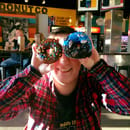Last month, I attended the Midwest Bisexual Lesbian Gay Transgender Ally College Conference, known as MBLGTACC for short. The conference, which celebrated its twenty-fifth anniversary this year, was held at Navy Pier in Chicago from February 17–19. Although it is based in the Midwest and primarily focuses on issues of interest to LGBTQ+ college students and educators in that region, people from all across the United States can and do attend this conference.
MBLGTACC consists of workshops, keynote addresses and these fun things called identity forums, which I’ll explain in just a bit.
There are eight workshops, held on the second two days of the conference, and these are by far my favorite part of MBLGTACC. This year I attended quite a few that had something to do with mental health, including one where we made our own zines (AKA handmade magazines) as part of a “self care through art” exercise and another where we learned how to avoid burnout as LGBTQ+ activists, a skill more important than ever due to today’s political climate!
I think my favorite workshops, however, were Trans Women & Video Games—which was about video games trans women have created, as well as their contributions to the world of gaming journalism, which was something I had never really considered before—and #BlackGirlMagic: The RAINBOW Edition, which was about the importance of finding images of black lesbians within the #BlackGirlMagic hashtag.
As for the keynote addresses, one of them was given by someone who I had recently heard speak in Iowa City! Patrisse Cullors, one of the co-founders of the #BlackLivesMatter movement, spoke about resisting the anti-LGBTQ+ policies of the new presidential administration—which, by the way, was a theme running through the entire conference. I overheard and was part of many discussions concerning how best to support our community and ourselves when it seems as though so much of our hard-won progress and victories are in danger of being stripped away. It’s definitely a scary moment in our country’s history, but thanks to Cullors’ speech and those conversations, I am slowly beginning to feel more confident about the resilience and power of our community.
I didn’t go to the second keynote address because I chose to visit Art Aids America Chicago (an exhibit about the history of AIDS/HIV in Chicago) instead, but I was told that the speaker—Peter Staley, who has worked with the AIDS activist group ACT UP for decades now—was very good. The third and final keynote speaker was Jennicet Gutiérrez, a transgender activist who burst onto the national LGBTQ+ scene after she interrupted former President Obama during a Pride celebration in June 2015 to protest the lack of attention being given to LGBTQ+ undocumented citizens, particularly other trans women.
Now that I’ve talked about the workshops and keynote addresses, it’s time for me to explain the identity forums. Identity forums are organized around a particular identity, such as gay, questioning, trans and so on and so forth. I attended the lesbian identity forum, as I did last year, and I had a blast. Last year we grew bored of sitting in a circle answering the prepared discussion questions, so we began playing games, such as trainwreck, which is a “get to know you” type of game where you say something that you’ve done and everyone who has also done that thing has to leave their spot in the circle and run across the room to find a new one. We ended up playing that game again this year! It was amazing to catch up with the friends I made at last year’s conference as well as to learn something about all the new faces I saw in the room this year.
I hope to attend MBLGTACC each year I am in college because I love it so much! I’m already super excited for next year’s conference, which will be held at the University of Nebraska. (The location of the conference changes from year to year but is always held somewhere in the Midwest.) When I talked to the other UI students who attended MBLGTACC with me, they all said something similar: attending this conference inspired them to be more confident, visible and open about who they are.


